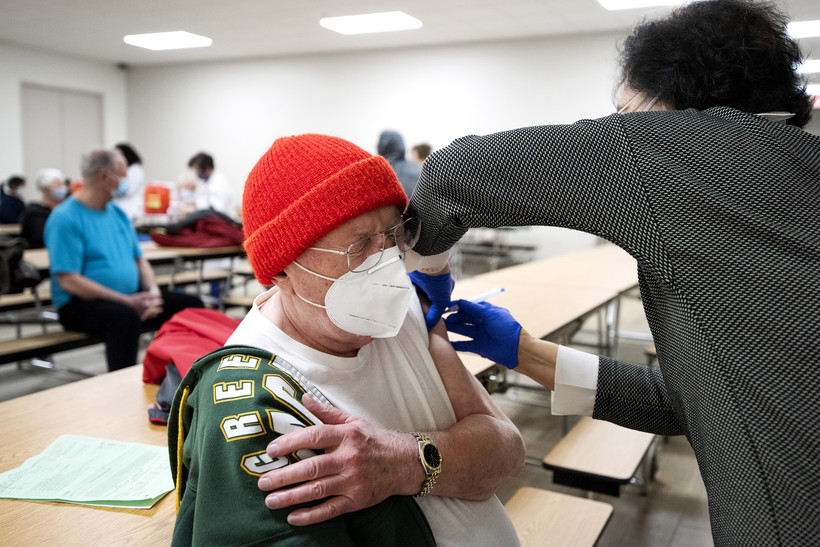Not Enough Getting Bivalent Booster Shots, State Health Officials Warn
Extra booster shot decreases hospitalization by 73% but most adults haven't gotten it.

Don Schildt receives a COVID-19 vaccination at Thursday, March 11, 2021, at Hayat Pharmacy in Milwaukee, Wis. Angela Major/WPR
Health officials are pushing Wisconsinites to get vaccinated as COVID-19 bivalent booster rates have fallen short of their goals ahead of the holiday season.
The BQ.1.1 and BQ.1 variants of the omicron virus only recently emerged, but taken together, they now account for nearly 70 percent of infections nationwide, according to the U.S. Centers for Disease Control and Prevention.
He emphasized that the COVID-19 vaccine “is not a one-time thing” as people’s immunity wanes over time.
A recent study by the CDC found that adults 65 and older who received the updated booster a week or more before getting infected were at a 73 percent lower risk of hospitalization than those who received at least two doses of the original vaccines.
“It’s always been the case that people who are older have a higher risk of becoming severely ill and dying if they become infected with COVID,” Westergaard said. He added that the “disproportionate burden of elderly patients has increased in the past six months, but not dramatically.”
Westergaard said a good goal for booster rates for the older age group would be at least 80 percent. While the bivalent boosters have been available for the last few months, only about 42 percent of those 65 and older in Wisconsin have received the updated boosters, compared to about 18 percent of those eligible statewide.
“We’re not trying to prevent all infections. We’re trying to prevent as many infections as we can to keep the people in our health care system, in our nursing homes, as safe as they can be,” he said.
Health officials worry ‘tripledemic’ has hospital resources ‘stretched too thin’
Dr. James Conway, a professor of pediatrics and the medical director of the UW Health immunization program, blamed slow booster rates in part on misinformation, politicization and poor public health communication when boosters were made available.
“As the virus keeps changing and as information has become more and more accessible, people have kind of struggled to put it all together and to decide what to do for their own well-being,” he said. “I think it’s not their fault. It’s that there’s been so much competing information.”
He said he’s worried about what that means for increased illness rates and hospitals already struggling to keep up with capacity.
Westergaard of DHS agreed, saying slow booster rates and the flu will add strains to the health care system.
“I think the thing we need to watch most carefully … are hospital resources being stretched too thin, and that is something affected by both COVID and influenza,” Westergaard said. “Our entire health care system has been working harder than it ever has been for the past three years, and we don’t have the surge capacity that we need.”
Health officials say masking, rapid tests remain important to stopping spread of COVID-19
According to Westergaard, vaccines for both COVID-19 and influenza are available at most pharmacies without a prescription. The Pharmacy Society of Wisconsin is also working to set up influenza and COVID-19 vaccine clinics at long term care facilities across the state.
Dr. Ajay Sethi, a professor of Population Health Sciences at the University of Wisconsin-Madison, said BQ.1 can be treated with Paxlovid, an antiviral drug. But in some cases, people with severe cases of COVID-19 may need to receive monoclonal antibodies, or injectable medical treatments at a hospital.
Sethi emphasized that masking remains one of the safest ways to protect yourself and the community against the virus.
“As people gather for the holidays, you know, getting a rapid test and verifying whether you could be infected is a good idea. And if you have any symptoms, stay home,” he said.
Listen to the WPR report here.
Booster rates fall short of health officials’ goals before holidays was originally published by Wisconsin Public Radio.
More about the Coronavirus Pandemic
- Governors Tony Evers, JB Pritzker, Tim Walz, and Gretchen Whitmer Issue a Joint Statement Concerning Reports that Donald Trump Gave Russian Dictator Putin American COVID-19 Supplies - Gov. Tony Evers - Oct 11th, 2024
- MHD Release: Milwaukee Health Department Launches COVID-19 Wastewater Testing Dashboard - City of Milwaukee Health Department - Jan 23rd, 2024
- Milwaukee County Announces New Policies Related to COVID-19 Pandemic - David Crowley - May 9th, 2023
- DHS Details End of Emergency COVID-19 Response - Wisconsin Department of Health Services - Apr 26th, 2023
- Milwaukee Health Department Announces Upcoming Changes to COVID-19 Services - City of Milwaukee Health Department - Mar 17th, 2023
- Fitzgerald Applauds Passage of COVID-19 Origin Act - U.S. Rep. Scott Fitzgerald - Mar 10th, 2023
- DHS Expands Free COVID-19 Testing Program - Wisconsin Department of Health Services - Feb 10th, 2023
- MKE County: COVID-19 Hospitalizations Rising - Graham Kilmer - Jan 16th, 2023
- Not Enough Getting Bivalent Booster Shots, State Health Officials Warn - Gaby Vinick - Dec 26th, 2022
- Nearly All Wisconsinites Age 6 Months and Older Now Eligible for Updated COVID-19 Vaccine - Wisconsin Department of Health Services - Dec 15th, 2022
Read more about Coronavirus Pandemic here



















